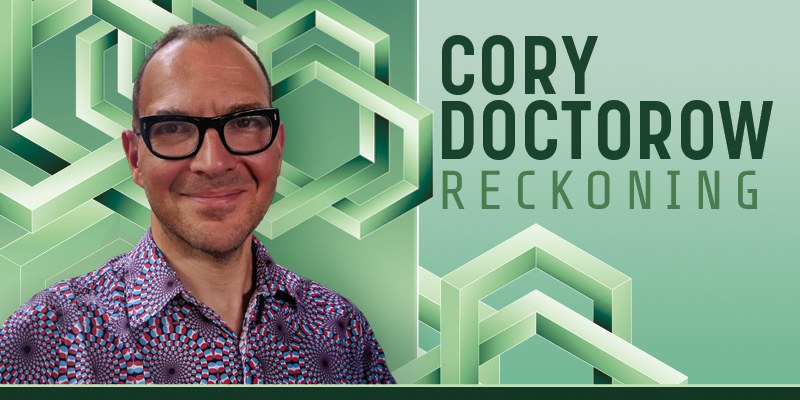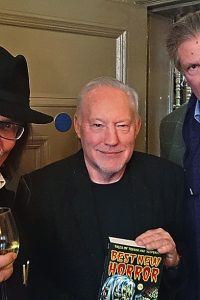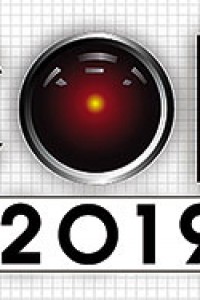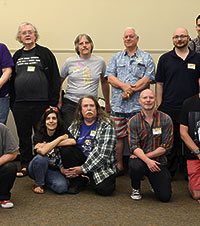Cory Doctorow: Reckoning
CORY EFRAM DOCTOROW was born July 17, 1971 in Toronto, Canada. He attended alternative schools and worked at SF specialty store Bakka Books, but dropped out of high school at 17 and briefly moved to Mexico to write. He dropped out of four universities in two years and worked as a CD-ROM programmer, website designer, volunteer in Central America, CIO for a film company and an ad agency, founder of a software company, and finally began working for the Electronic Frontier Foundation, a civil rights organization with an emphasis on technology. He married Alice Taylor in 2008, and they have a daughter.
Doctorow made his first semipro sale at 17, and his first professional story, ‘‘Craphound’’, appeared in Science Fiction Age in 1998. He attended Clarion in 1992, and has since been an instructor there. He won the Campbell Award for Best New Writer in 1999, and novelette ‘‘0wnz0red’’ was nominated for a Nebula in 2004. ‘‘I, Robot’’ (2005) was a Hugo and British SF Award finalist, and won a Locus Award, as did ‘‘When Sysadmins Ruled the Earth’’ (2006) and ‘‘After the Siege’’ (2007).
First collection A Place So Foreign and Eight More (2003) won the Sunburst award in 2004, and more short work was collected in Overclocked: Stories of the Future Present (2007), With a Little Help (2010), and Radicalized (2019). PM Press published The Great Big Beautiful Tomorrow (2011) as part of their Outspoken Authors series. Other stories were adapted as comics in Cory Doctorow’s Futuristic Tales of the Here and Now (2008).
Locus Award-winning first novel Down and Out in the Magic Kingdom appeared in 2003, followed by near-future SF Eastern Standard Tribe (2004) and urban fantasy Someone Comes to Town, Someone Leaves Town (2005). His bestselling YA Little Brother (2008) won the Campbell Memorial Award, Prometheus Award, and Sunburst Award, and was shortlisted for the Hugo and Nebula Awards. It was also adapted as a stage play. Sequels include Homeland (2013) and Attack Surface (2020). Other novels include Makers (2009), For the Win (an expansion of story ‘‘Anda’s Game’’), Pirate Cinema (2012), Dragon Award winner Walkaway (2016), and The Lost Cause (2023). He launched the Martin Hench series with Red Team Blues in 2023, followed by The Bezzle in 2024; additional installments are forthcoming.
Doctorow collaborated with Charles Stross on several stories, including ‘‘Unwirer’’, ‘‘Flowers from Al’’, and ‘‘Jury Service’’ and its sequel ‘‘Appeals Court’’, which formed the basis for novel The Rapture of the Nerds (2012). With Benjamin Rosenbaum, he collaborated on Hugo and Nebula finalist ‘‘True Names’’ (2008). Graphic novel In Real Life, created with Jen Wang, appeared in 2014.
With Karl Schroeder, he wrote non-fiction The Complete Idiot’s Guide to Publishing Science Fiction (2000), and some of his essays were collected in Content: Selected Essays on Technology, Creativity, Copyright, and the Future of the Future (2008). Follow-up Context: Further Selected Essays on Productivity, Creativity, Parenting, and Politics in the 21st Century appeared in 2011. Business and creativity book Information Doesn’t Want to Be Free came out in 2014, and The Internet Con: How to Seize the Means of Computation, about the dangers of Big Tech, in 2023. He co-edited anthology Tesseracts Eleven with Holly Black (2007).
Doctorow is a longtime Locus columnist, writing about technology and culture, among other topics. He was European Affairs Coordinator for the Electronic Frontier Foundation until 2006, when he quit to write full-time. He is a special consultant to the EFF now, and serves on the boards of various organizations related to technology and literature. He was named the 2006-2007 Canadian Fulbright Chair in Public Diplomacy at the USC Center on Public Diplomacy, and did a one-year writing and teaching residency at USC (2006-07). He received an honorary doctorate in computer science from Open University, where he is a visiting professor. He is also an MIT Media Lab Research Affiliate. He lives in Burbank CA.
Excerpt from the interview:
“I wrote nine books during lockdown – I write when I’m anxious. I’ve had chronic pain all my life, and it’s not really treatable. The thing I figured out a long time ago is that when I’m working, I don’t notice the pain, which is a mixed blessing, because that’s how you end up sitting in one posture for so long that you do yourself an injury. It turns out that writing is also my strategy for emotional distress. During COVID, when I was at my lowest, I was just writing and writing and writing because so long as I was writing, I wasn’t thinking about COVID.
“One of the things that completely changed the course of my life was when Bruce Sterling gave a speech to the Game Developers Conference, I think in ’91 or ’92. It was a keynote called ‘The Wonderful Power of Storytelling’, and it’s about how storytelling is bullshit. It’s a very Sterlingian kind of thing. There’s a bit in it where he says, ‘If you want to tell high fantasy stories, don’t read Tolkien – read the people Tolkien was reading. Or, better yet, read who they were reading.’ Don’t rebrew the thrice-brewed tea bags of Tolkien.’ That’s what Heinlein did, by bringing the tropes of men’s fiction, spy fiction, and political thrillers into science fiction. That’s also what Neal Stephenson did – he went to the same well that Heinlein went to, and brought that into a lot of his books. One of my favorites of his books was not published under his name, originally: Interface, published as Stephen Bury and co-written with J. Frederick George. It’s a political thriller, and it’s full of ‘how stuff works.’ It’s like an alternate-universe timeline, if Heinlein had been a different kind of writer but had some of the same influences, it would have come out that way. I’m going back to some of those same wells of exposition – the kind of exposition that makes books better and not worse – and I’m drawing it into those stories.
“I taught a lot of writing workshops over the years: Viable Paradise, Clarion, Mary Robinette Kowal’s workshop on a cruise ship, master classes at literary festivals, and whatnot. There’s a set collection of things I tell people, because I don’t think there’s a lot to teach about writing – mostly, it’s practice, and reviewing other writers’ work critically so you get better at being critical about your own. It can be useful, but that’s one of the reasons that I tell people, ‘Don’t go to two of these things – do an MFA, or Clarion, or Viable Paradise, don’t do both. You’ll just get grossly diminishing returns.’
“I was teaching, and this student said, ‘I know all these rules about writing, like “show don’t tell,” but I read work I like, including your work, and it breaks the rules. When should I break the rules?’ The thing that you’re supposed to say is: ‘You have to master the rules in order to break the rules.’ You can’t play jazz until you can play scales. I actually think that’s bullshit! We have no idea why books work, but we do know why they fail. We know what’s hard to do – we know what things are trickiest to pull off without boring the reader, or offending the reader, or just killing whatever it is that allows the reader to suspend their disbelief and pretend that your imaginary made-up things matter. When you get a story, and you’re trying to figure out why it’s not working for you, what we tend to do is grasp for one of the things that we know is hard to do, and see if it’s in the story. If so, we say that’s probably the thing they’re getting wrong.
“If you bring a car to a mechanic with a set of symptoms, even before they lift the hood, they’re going to say, ‘Oh, it’s a 12-year-old Prius and it’s doing this, so it’s probably A, and if it’s not A, it’ll be B.’ In many cases, they just replace that part, and if it works, they say, ‘Okay, that’s what was wrong with it.’ Often when you’re trying to make a story better, you’re thinking critically about how to make art better, and you say things like, ‘There’s too much exposition in this.’ But it could be that the reason the exposition isn’t landing is because its salience hasn’t been significantly connected to the character because the character hasn’t been well-drawn enough. In order to carry your weak character, you can’t have as much exposition as you want. There are two ways of fixing that: One is, you can make the character better, and the other is, you can take the exposition out and try for something easier. That’s our writing-improvement methodology. But exposition is good! I love exposition.
“This is all by way of saying that the vibe of the Martin Hench books – Red Team Blues and The Bezzle – and the reason they fly as SF, is because SF shares some lineage with work that is not afraid of exposition: Westerns, spy novels, political fiction. These are books that deal with technology, and because they deal with technology in an expository way, even though they’re not speculating about technology, these are the methods of science fiction. This is why Neal Stephenson’s books about Newton and Leibniz set in the 17th century are still science fiction.
“Too much exposition is often a criticism of the genre. Cinematic science fiction has a lot of overlap with literary science fiction, but there are some severe disjoints – there are things that you cannot do in written science fiction. If you did the Matrix eyeball kick that we’re all batteries in gel pods in a book, it would be so stupid. Do you know the Turkey City Lexicon, going back Bruce Sterling and Lewis Shiner? It’s a list of terms for common problems in workshop stories. One of those terms is, ‘For you see, we are all living in a jar of Tang!’ I think it’s a reference to a Twilight Zone episode. I don’t even have to explain it, right? If you put the Matrix reveal in a book, it would be silly, but in the movie, it’s just a pure eyeball kick. I’m not saying it’s bad to develop science fiction that doesn’t hew to our literary tropes or conventions, but it’s different, and it becomes a related but distinct field. I can remove the part of the genre that’s speculative, and leave in the part with the critical lens and the expository lens, and create a work that feels science fictional, even though it’s basically a crime thriller. In the same way, you can also take out the lens, and leave in the science fiction furniture, and get something that’s different as well.
Interview design by Francesca Myman
Read the full interview in the June 2024 issue of Locus.
 While you are here, please take a moment to support Locus with a one-time or recurring donation. We rely on reader donations to keep the magazine and site going, and would like to keep the site paywall free, but WE NEED YOUR FINANCIAL SUPPORT to continue quality coverage of the science fiction and fantasy field.
While you are here, please take a moment to support Locus with a one-time or recurring donation. We rely on reader donations to keep the magazine and site going, and would like to keep the site paywall free, but WE NEED YOUR FINANCIAL SUPPORT to continue quality coverage of the science fiction and fantasy field.
©Locus Magazine. Copyrighted material may not be republished without permission of LSFF.







